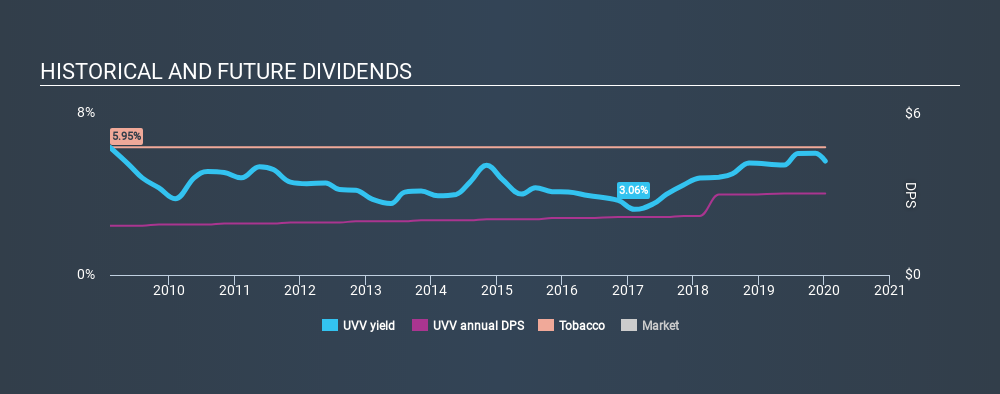- United States
- /
- Tobacco
- /
- NYSE:UVV
Why It Might Not Make Sense To Buy Universal Corporation (NYSE:UVV) For Its Upcoming Dividend

Some investors rely on dividends for growing their wealth, and if you're one of those dividend sleuths, you might be intrigued to know that Universal Corporation (NYSE:UVV) is about to go ex-dividend in just 3 days. Ex-dividend means that investors that purchase the stock on or after the 10th of January will not receive this dividend, which will be paid on the 3rd of February.
Universal's next dividend payment will be US$0.76 per share, on the back of last year when the company paid a total of US$3.04 to shareholders. Last year's total dividend payments show that Universal has a trailing yield of 5.3% on the current share price of $57.29. Dividends are an important source of income to many shareholders, but the health of the business is crucial to maintaining those dividends. That's why we should always check whether the dividend payments appear sustainable, and if the company is growing.
View our latest analysis for Universal
If a company pays out more in dividends than it earned, then the dividend might become unsustainable - hardly an ideal situation. Its dividend payout ratio is 85% of profit, which means the company is paying out a majority of its earnings. The relatively limited profit reinvestment could slow the rate of future earnings growth We'd be worried about the risk of a drop in earnings. Yet cash flows are even more important than profits for assessing a dividend, so we need to see if the company generated enough cash to pay its distribution. Over the past year it paid out 114% of its free cash flow as dividends, which is uncomfortably high. We're curious about why the company paid out more cash than it generated last year, since this can be one of the early signs that a dividend may be unsustainable.
Universal paid out less in dividends than it reported in profits, but unfortunately it didn't generate enough cash to cover the dividend. Were this to happen repeatedly, this would be a risk to Universal's ability to maintain its dividend.
Click here to see how much of its profit Universal paid out over the last 12 months.

Have Earnings And Dividends Been Growing?
When earnings decline, dividend companies become much harder to analyse and own safely. Investors love dividends, so if earnings fall and the dividend is reduced, expect a stock to be sold off heavily at the same time. Universal's earnings per share have fallen at approximately 9.2% a year over the previous five years. Ultimately, when earnings per share decline, the size of the pie from which dividends can be paid, shrinks.
The main way most investors will assess a company's dividend prospects is by checking the historical rate of dividend growth. In the past ten years, Universal has increased its dividend at approximately 5.1% a year on average. The only way to pay higher dividends when earnings are shrinking is either to pay out a larger percentage of profits, spend cash from the balance sheet, or borrow the money. Universal is already paying out a high percentage of its income, so without earnings growth, we're doubtful of whether this dividend will grow much in the future.
Final Takeaway
Has Universal got what it takes to maintain its dividend payments? It's definitely not great to see earnings per share shrinking. The company paid out an acceptable percentage of its income, but an uncomfortably high percentage of its cash flow over the past year. It's not that we think Universal is a bad company, but these characteristics don't generally lead to outstanding dividend performance.
Curious about whether Universal has been able to consistently generate growth? Here's a chart of its historical revenue and earnings growth.
We wouldn't recommend just buying the first dividend stock you see, though. Here's a list of interesting dividend stocks with a greater than 2% yield and an upcoming dividend.
If you spot an error that warrants correction, please contact the editor at editorial-team@simplywallst.com. This article by Simply Wall St is general in nature. It does not constitute a recommendation to buy or sell any stock, and does not take account of your objectives, or your financial situation. Simply Wall St has no position in the stocks mentioned.
We aim to bring you long-term focused research analysis driven by fundamental data. Note that our analysis may not factor in the latest price-sensitive company announcements or qualitative material. Thank you for reading.
About NYSE:UVV
Universal
A business-to-business agriproducts company, provides leaf tobacco and plant-based ingredients to food and beverage end markets worldwide.
6 star dividend payer with adequate balance sheet.
Similar Companies
Market Insights
Community Narratives




